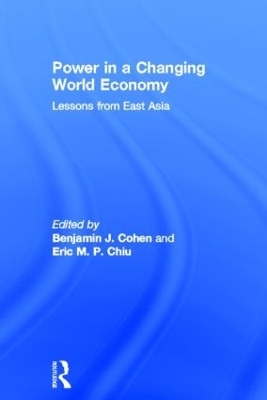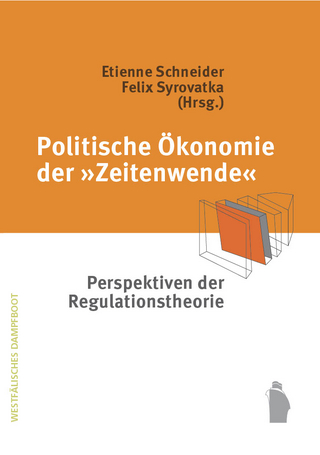
Power in a Changing World Economy
Routledge (Verlag)
978-0-415-85614-0 (ISBN)
This book is about power in a changing world economy. Though power is ubiquitous in the study of International Political Economy, the concept is underdeveloped in formal theoretical terms. This collection of essays analyses recent experience in East Asia to advance our theoretic understanding of state power in IPE. Over the last quarter century, no other region of the world has had a greater impact on the global distribution of economic resources and capabilities. China, with its "peaceful rise," now stands as the second largest national economy on the face of the earth; South Korea and Taiwan have become industrial powerhouses; Hong Kong and Singapore are among the world’s most important financial centres; and new poles of growth have emerged in several southeast Asian countries – all while Japan, long the region’s dominant market, has slipped into seemingly irreversible decline. The volume’s nine essays, contributed by leading scholars in the United States, Britain and Taiwan, aim to extract relevant inferences and insights from these developments for the study of state power. All are framed by a core agenda encompassing four key clusters of questions concerning the meaning, sources, uses, and limits of power. These essays ask: What new lessons are offered for power analysis in International Political Economy?
Benjamin J. Cohen is Louis G. Lancaster Professor of International Political Economy at the University of California, Santa Barbara. A specialist in the political economy of international money and finance, he is the author of thirteen books, including the geography of money (1998), the future of money (2004), and the future of global currency (2011). Eric M.P. Chiu is an Associate Professor and Director at the Graduate Institute of National Policy and Public Affairs at the National Chung Hsing University in Taiwan. His research interests include international political economy and international money and finance, with specific focus on both emerging and developing countries.
Introduction. Benjamin J. Cohen and Eric M.P. Chiu, Part I: Regional Trends, Chapter 1. Measuring Power and the Rise of East Asia Eric M.P. Chiu and Thomas D. Willett, Chapter 2. Financial Crisis and Asia’s Changing Balance of Power Vincent Wei-cheng Wang, Chapter 3. Managing Capital Inflows: An Exercise in Productive Power Jeffrey M. Chwieroth, Part II: The Power of a Rising Power Chapter 4. Choice and Coercion in East Asian Exchange Rate Regimes C. Randall Henning, Chapter 5. China’s Role in CMIM: A Reluctant and Constrained Leadership Chen-Dong Tso and Kuo-Chun Yeh, Chapter 6. China-Vietnam Relational Asymmetries: A Fungibility Problem Alan Hao Yang, Chapter 7. The Yuan’s Long March Benjamin J. Cohen, Part III: The Power of a Declining Power, Chapter 8. Japan’s Manufactured Innovation: In Search of Influence Zheng-jia Tsai and James W.Y. Wang, Chapter 9. Japanese Financial Reform: Liberalizing Against the Clock William W. Grimes.
| Erscheint lt. Verlag | 1.11.2013 |
|---|---|
| Zusatzinfo | 15 Tables, black and white; 9 Line drawings, black and white; 9 Illustrations, black and white |
| Verlagsort | London |
| Sprache | englisch |
| Maße | 156 x 234 mm |
| Gewicht | 453 g |
| Themenwelt | Sozialwissenschaften ► Politik / Verwaltung |
| Sozialwissenschaften ► Soziologie ► Spezielle Soziologien | |
| Wirtschaft ► Volkswirtschaftslehre ► Finanzwissenschaft | |
| Wirtschaft ► Volkswirtschaftslehre ► Makroökonomie | |
| Wirtschaft ► Volkswirtschaftslehre ► Wirtschaftspolitik | |
| ISBN-10 | 0-415-85614-0 / 0415856140 |
| ISBN-13 | 978-0-415-85614-0 / 9780415856140 |
| Zustand | Neuware |
| Haben Sie eine Frage zum Produkt? |
aus dem Bereich


